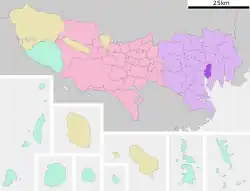Nihonbashi Bakurochō (日本橋馬喰町), known in short as Bakurochō (馬喰町),[1] is a neighborhood in Chuo-ku, Tokyo.
It is at the intersection of the Kanda River and the Sumida River. Its name means "horse trader town",[1] a reference to how it was formerly a center for selling and buying horses.[2]
It is known as a center for the textile trade.[1] Additionally, Matjaz Ursic and Heide Imai, in Creativity in Tokyo: Revitalizing a Mature City, stated that the concentration of hotels, stemming from lodging needed for horse trading, gave the Bakurochō area fame.[3]
Education
Public elementary and junior high schools are operated by Chuo City Board of Education (中央区教育委員会). Hisamatsu Elementary School (中央区立久松小学校) and Nihonbashi Junior High School (中央区立日本橋中学校) are the zoned public schools of Bakurochō. Bakurochō 1 and 2-chome can choose between Hisamatsu or Nihonbashi (中央区立日本橋小学校) elementary schools.[4]
References
- 1 2 3 Hughes, Kimberly (2021-07-20). "Tokyo Neighborhood Guide: Bakurocho". Tokyo Weekender. Retrieved 2023-01-06.
- ↑ Ursic, Matjaz; Imai, Heide (2020-09-08). Creativity in Tokyo: Revitalizing a Mature City. Springer Nature. p. 144. ISBN 9789811566875.
- ↑ Ursic, Matjaz; Imai, Heide (2020-09-08). Creativity in Tokyo: Revitalizing a Mature City. Springer Nature. pp. 144-145. ISBN 9789811566875.
- ↑ "区立学校一覧". Chuo City. Retrieved 2022-10-08. - Look up "馬喰町" (Bakurocho) to find the zoning. "通学区域" means school attendance boundary (comes up as "school district" on Google Translate). For info on the "adjustment zone" (for 1 and 2-chome) see "【調整区域】" entry #3 which includes "馬喰町一丁目、馬喰町二丁目" with "久松小" (Hisamatsu ES) and "日本橋小" (Nihonbashi ES) listed as the choices.
